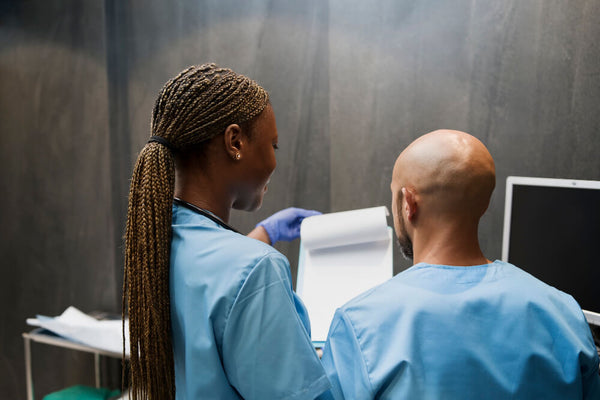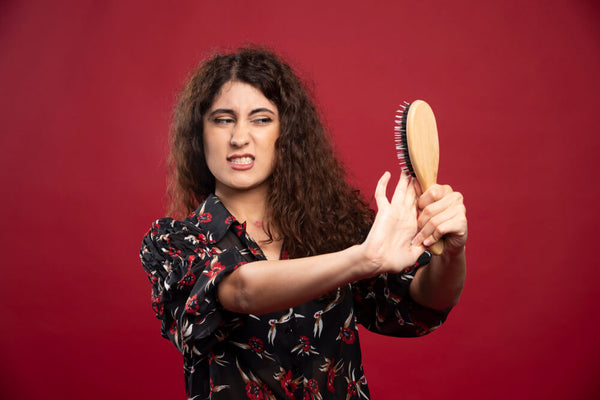I want you to think about the last time you really looked at your hair. I mean really looked. That moment when you noticed your part was wider than you remembered. When you saw more scalp than hair around your edges. That sinking feeling in your stomach when you realized this isn't just "bad hair days" - something is actually wrong.
If you're reading this, you've probably tried everything. The special shampoos. The growth oils. The vitamins. But nothing seems to actually stop the thinning. Let me tell you what most women don't realize: thinning hair is usually a symptom, not the actual problem. And until you treat the root cause, you'll keep fighting the same losing battle.
Is Your Thinning Hair Actually Pattern Baldness or Something Else?
Here's what frustrates me: so many doctors automatically diagnose women with "female pattern hair loss" without doing the proper detective work. The truth is, while pattern baldness exists in women, what most Black women experience is usually something else entirely.
The thinning we see most often comes from:
-
CCCA - that slow, scarring hair loss that starts at your crown.
-
Traction alopecia - from years of tight braids, weaves, and extensions.
-
Chronic telogen effluvium - that constant shedding from internal stressors.
-
Hormonal shifts - after babies, during perimenopause, or from thyroid issues.
The pattern of your thinning tells a story. A widening part might be hormonal. Thinning edges scream traction. A bald spot at your crown could be CCCA. That's why proper diagnosis matters - you can't fix what you haven't properly identified.
Could Your Stress Actually Be Making Your Hair Fall Out?
I know you've heard "just relax" a million times. But let me explain what's really happening when stress attacks your hair.
When you're chronically stressed, your body pumps out cortisol. This stress hormone literally tells your hair follicles to stop growing and start shedding. But here's what nobody tells you: the hair loss doesn't happen when you're stressed. It happens 2-3 months later.
So that massive shedding you're experiencing right now? That might be from the stress you went through last season. The project deadline, the family drama, the sleepless nights - it all shows up in your hair months later.
The solution isn't just "meditate more." We need to support your body's stress response systems while also using treatments that tell your follicles it's safe to start growing again.
Are Your Nutrient Deficiencies Starving Your Hair?
I see this pattern every single day in my Atlanta clinic. Women come in with thinning hair, and when we run their blood work, we find:
-
Ferritin levels below 50 (your hair can't grow without sufficient iron stores).
-
Vitamin D in the toilet (especially common in Black women).
-
Zinc levels that are barely detectable.
-
B12 deficiencies from digestive issues.
Your hair is literally made from the nutrients you eat. When your body is deficient, it prioritizes your vital organs first. Your hair gets whatever's left over - which often isn't enough to sustain growth.
This is why generic supplements rarely work. You need to know exactly what you're deficient in before you start supplementing.
What's Really Working for Thinning Hair in 2025?
Honestly, I have to say it: those growth serums that you find at the beauty supply store? They are not going to fix real hair loss. In fact, they can only make the hair you already have look nicer but they cannot revive dead follicles or stop the causes that are going on under the surface.
Here is the actual working method for the women from our clinic:
-
PRP Therapy - This uses your body's own growth factors to wake up dormant follicles.
-
Exosome Therapy - This sends specific messages to follicles to reduce inflammation, stimulate growth.
-
Nutrient Optimization - This corrects the specific deficiencies of your hair.
-
Scalp Treatments - This creates a healthy environment that your follicles need to grow.
The best approach is usually a combination of these, tailored to your specific type of thinning.
When Should You Really Start Worrying About Thinning Hair?
I tell all my clients: if you're noticing changes in your hair, it's already time to act. Don't wait until you have visible bald spots.
The early warning signs include:
-
Your part looks wider in photos.
-
You see more hair in your brush than usual.
-
Your ponytail feels significantly smaller.
-
Your edges look softer or less defined.
-
You can see more scalp when your hair is pulled back.
The earlier we intervene, the more hair we can save. Once follicles scar over completely, we can't bring them back.
Why Do So Many Treatments Fail for Black Women's Hair?
Most hair loss treatments were designed for male pattern baldness or Caucasian hair types. They don't account for:
-
The unique structure of our coiled hair follicles.
-
The inflammation patterns in Black scalps.
-
The cultural practices that affect our hair health.
-
The different ways conditions present on melanated skin.
This is why we need culturally competent care that understands these differences and creates treatment plans that actually work for our hair.
Want To Get Your Healthy Hair Back?
Stop guessing what might help your thinning hair. Let's actually figure out what's causing it and create a plan that addresses the root issues.
Book your $99 Hair Therapy Evaluation now at Nina Ross Hair Therapy and we'll examine your scalp, review your health history and give you the honest truth about what's happening - and how we can fix it.














